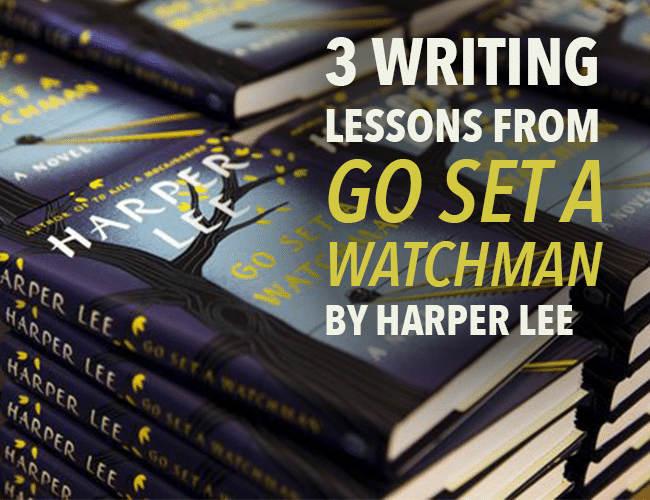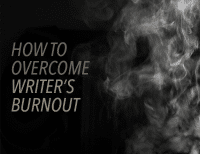The beloved classic To Kill A Mockingbird has a sequel. Go Set A Watchman by Harper Lee was released on July 14th. In its first week of publication, Go Set a Watchman sold 1.1 million copies, the most ever sold in a week by Harper Collins.

How Go Set a Watchman Was Written
The novel was actually completed in 1957 and was written prior to the famous To Kill A Mockingbird.
At first, publishers rejected it. In fact, Harper Lee's publisher asked her to revisit the plot and create a more focused story-line. Out of Go Set A Watchman, To Kill A Mockingbird was birthed.
Naturally, when the book came out I rushed to get it. A sequel to a classic deserves to be read. To read the first chapter of the book, check it out here.
“The spark of the true writer flashed in every line,” said Tay Hohoff, her editor, after reading the manuscript in 1957. Despite the controversy behind the book's release, we can still see those sparks throughout Watchman, and take away an important lesson from a great writer.
3 Writing Lessons from Go Set a Watchman
Harper Lee's biggest success in Go Set a Watchman is how skillfully she crafts an unmistakable Southern tone.
I'm naturally a fast reader, sometimes even a skimmer, but as I read Go Set a Watchman, I found myself slowing, pausing, and feeling sucked into the slow Southern culture illustrated in the novel.
Here are three things we can learn about how to craft our own tone in our writing:
1. Culturally Specific Vocabulary and Jargon
Lee stays consistent in her vocabulary in order to facilitate a 1950's Southern atmosphere in her writing. Each word is tailored to the setting and character speaking. Lee uses words common at the time but which wouldn't be acceptable today (“negro,” for example).
Another technique is using relevant jargon. Jargon is the special words or expressions that are used by a particular profession or group. While you should generally avoid jargon, especially when writing non-fiction, because it creates distance between you and the reader, Lee's use of Southern jargon helps saturate the reader in the scenes and culture of her setting.
For example, here's a quote that includes a few words most of us would find unusual unless we grew up in the South in the 1950s:
He was a short, square built, cotton-headed individual with the face of an angel and the cunning of a stoat.
What vocabulary or jargon does your story call for? Business? Religious? Cultural?
2. Deliberate Punctuation
Go Set a Watchman has very deliberate punctuation. It is a great example of how punctuation can cause your reader to pause, slow, or read quickly.
Here's an example of how Lee uses punctuation to control the reader's pace from Chapter 4 of Go Set a Watchman:
Instead, Maycomb grew and sprawled out from its hub, Sinkfield's Tavern, because Sinkfield made the surveyors drunk one evening, induced them to bring forward their maps and charts, lop off a little here, add a bit there, and adjust the center of the county to meet his requirements. He sent them packing the next day armed with their charts and five quarts of shinny in their saddlebags—two apiece and one for the Governor.
Lee's sentence structure varies with each sentence. In one paragraph there's a sentence with seven commas. The next sentence has none, but uses a dash instead to slow the pace.
A tone is easily developed when you use deliberate punctuation. This goal is not achieved simply because you used correct punctuation, but intentional.
What intentional punctuation do you like to use? Ellipses? Dashes? Short sentences?
3. Imagery
In my opinion, the first chapter of this book is actually the best because of it's stunning imagery.
The countryside and the train had subsided to a gentle roll, and she could see nothing but pastureland and black cows from window to horizon. She wondered why she had never thought her country beautiful.
This imagery fits almost perfectly to the feeling and setting Harper Lee is trying to attain. The imagery is slight, but also changes the reader's pace. As pictured, there is no rush within the characters dialogue or thoughts, allowing the reader to relax into the narrative.
How can you use imagery to sway your reader in a particular way?
The Controversy Behind Go Set a Watchman
There are three main points of controversy surrounding this novel and it's publication:
- The Novel's Quality. Go Set a Watchman was actually written before To Kill a Mockingbird, and was rejected for being “more a series of anecdotes than a fully conceived novel.” Its publication now has been questioned for being profiteering on the part of Harper Collins at the expense of the legacy of To Kill a Mockingbird.
- Whether Harper Lee actually wanted the novel to be published. Harper Lee is now 88 years old, blind, a stroke survivor. For years, she resisted publishing Go Set a Watchman, or any other book. It's strange that now, shortly after her sister, who acted as her attorney, passed away, she agreed to publish her novel. Was she able to consciously make the decision in good faith?
- Atticus Finch's Segregationist Politics. Atticus Finch is one of the great heroes of twentieth century literature, but in Go Set a Watchman, Jean “Scout” Louise struggles against her idealized image of her father and his segregationist politics. Apparently, Atticus, who is modeled after Harper Lee's father, was also a lawyer who believed segregation was better for both blacks and whites. He later changed his views and became a staunch supporter of the civil rights movement. But will Atticus' legacy be tainted by Go Set a Watchman's depiction of him?
While I'm not an expert and don't feel able to make a decision on whether this controversy is true or not, I did read the book and research quite a bit. Here are four articles from respected resources that shed light on the controversy:
- New York Times Book Review
- The Story Behind Go Set a Watchman by The New York Times
- Harper Lee's Friend by NPR
- The New Yorker Review
Have you read Go Set a Watchman? What did you think of the novel? Let us know what you think in the comments below.
PRACTICE
Choose one of the three techniques Harper Lee uses and practice free-writing for fifteen minutes. Keep your tip in mind and use it as often as you can in your piece.
When your time is up, post your piece in the comments below and we'll guess your theme or tone!
Happy writing!







She second guessed her decision as she stood at the edge of the sea–the cold Atlantic lapping over her toes. What if she couldn’t make it, ducking and diving, paddling and praying, wondering and wishing, as she gripped the rails of her surfboard and leaped in, salt spray sprinkling over her face.
Kristen this is a great scene! I absolutely LOVE the imagery! Great job!
I’m surprised Harper Lee’s sister didn’t leave instructions for the book- that it was never to be published, or something. It’s too bad at least, that someone didn’t edit the book to be more in keeping with the first.
I’m reading and thoroughly enjoying William Zinsser’s book, On Writing Well. It’s already helped me a great deal. Here’s my contribution:
I woke up, stretched, and yawned. It was another chilly, wet day. I hunched my shoulders against the damp and stood. Living and sleeping outside was telling on me; each day and night on the street made me feel older than Methuselah, and twice as wise. I hoped I found something to eat before my stomach contracted and never went back to normal. I was warm enough now, but didn’t like getting wet. It was hard to
get dry and warm again on days like this.
Maybe today I’d stumble on a house with an open window or a door left ajar-slip inside while the owners were at work, and make myself comfortable. Find food; sleep on a bed or sofa for a few hours.
This was risky business; I’d have to keep an ear open, so to speak, for residents arriving home, or dogs on the loose. Life on the street requires a sixth sense for
danger. Last time, a dog appeared at the door of the living room, saw me, and
set up a ruckus loud enough to wake the dead. I’d effected my exit, jumping out
the window I’d come in, a hair’s breadth in front of his snapping teeth.
Gigi, this was really great. It read very smooth. Great vocabulary and paragraph formation. I might have to pick up that book you’re reading on writing! Thanks for sharing!
Thank you! I really like his books- he also wrote one on writing a memoir. Very useful and entertaining. When a non-fiction book about writing holds your interest to the very end, the writer’s doing something right-
Your tips reminded me of his book, so you’re doing something right, too- thanks!
I really like this scene, too. Only one very minor bit of editing I’d suggest:
“before my stomach contracted and never went back to normal.”
We’re going along in past tense, then all of a sudden in we’re in future-looking-back mode. How about keeping it as a present thing with the consequence to come later? Something like: “before my stomach contracted and could never make it back to normal again.”
Actually, I think this story would be just as good written all in present tense. “I hope I find something to eat before my stomach contracts and can never get back to normal.”
I got a copy of Go Set a Watchman for my birthday, and have yet to read it but I am looking forward to doing so! Hope it won’t ruin To Kill a Mockingbird for me, since I’ve been hearing a lot of people saying it has for them. Anyway, in relation to Tip #3, a small section from my WIP. As always, reviews are much appreciated!
I grabbed my bike from the rack and started pedaling home. The front lawn was a jungle again. Security guards kicked kids off the grass and parents fought for parking spots
by the sidewalk, honking their car horns. I went home the way I had come that morning.
The houses around the high school were all bright colors, greens and blues and reds. The lawns sloped up like little hills, and the houses perched on top and looked down at everyone on the road. I could point out all of the interesting properties like a tour guide. There was the purple house that had been burned out by a fire. There was the house with the lawn statues made out of junk. The cow built of bed springs and soup cans stared at me cross eyed as I went by. I coasted into the Village, past the real estate office, the movie theater, Miss Lin’s Chinese takeout. It was crowded with middle-schoolers hanging out on the corners and generally making it difficult to stay on the sidewalk. The old crossing guard who’d worked the intersection in the middle of town for as long as I could remember herded kids across the street with his red stop sign and long suffering eyes.
Good work on the imagery. I can see that cross-eyed cow and got a chuckle out of the crossing guard “herding” kids across the street.
I’m intrigued, too. What’s going on?
Here’s my submission. My technique is
imagery.
He stood at a three-way intersection. Dirt roads–little more than well-traveled trails–stretched away over the hills to his right, to his left and forward, and behind him. Slowly, he pivoted, scanning the landscape. The only sign of the way he’d traveled to get to that spot was lingering dust, fading slowly in what was an uncustomarily windless day for the middle of the Flint Hills.
Frustrated, he took off his had and slapped his thigh. How in the world had he ended
up in such a God-forsaken place?
He pivoted again, this time searching the horizon. In every direction, one hill after
another marched into the distance like waves of a vast green ocean frozen in place. In the distance, they were faint, nearly blue against a cloudless sky. Cattle populated some of them, but even on the nearest hill, they looked more like multi-colored ants than cattle. Everything looked miniature. Oil pumps. Microwave towers. The dim silhouettes of high-tension line towers. Everything was so…. vast. And empty.
And that was part of the problem. How was he supposed to find subjects for paintings in
a place like this? Yes, there was a lot of it, but it was all the same. Get to the top of one hill and there was another. For miles. He’d driven for hours from the last stop at a
country store and nothing had changed except the position of the sun and the position of the fuel tank indicator. Both were descending.
The last thing he wanted to was be stuck in the middle of nowhere after dark. He wanted even less to be stuck without fuel.
But which way to go?
He didn’t want to go back the way he’d come. There was nothing there he wanted to see again. Not even the country store or its rustic proprietor. The man who’d told him he’d find exactly what he was looking for on Texaco Hill. Well, if this was Texaco Hill—and he thought it must be because he’d followed the map the old man had given him—he’d been lied to.
Lied to and made a fool of.
Again.
He turned to face the other roads, studying first the one to the right. It descended
the hill to the east, dipped across a deep and wide valley, then wound up the next hill. Where it disappeared around the hill, it clung to the side like a desperate mountain climber. He saw no trace of it beyond the hill. He turned to the left.
That road looked only slightly more friendly. It dipped and bobbed over the rest of the hill on which he stood then simply dropped out of sight. What was beyond it, he had no way of knowing. Ranch house, small town, or nothing at all. Just wide open blue sky and grass. All that grass.
None of the choices gave him any joy. With a sigh, he dug in his pocket for one of the handful of coins resulting from his last purpose.
“Heads, right. Tails, left,” he thought with little hope, then flipped it into the air. It landed at his feet, bounced twice, then rolled to the grass along the edge of the road. Tails. So be it.
A light mist danced over the surface of
the lake, its elegant movement caused by the gentle breeze that had come up
after the light thundershowers in the region while the sunset created a cascade
of gold and orange in the early evening skies.
Across the dampened lawns of the century-old estate and confined within
the walls of the antique-furnished study, the ramblings of a man gone insane
should be an all too familiar sound. This time however, insanity was spilling
out of a completely different mouth and under entirely different circumstances.
A light mist danced over the surface of the lake, its elegant movement caused by the gentle breeze that had come up after the light thundershowers in the region while the sunset created a cascade of gold and orange in the early evening skies.
Across the dampened lawns of the century-old estate and confined within the walls of the antique-furnished study, the ramblings of a man gone insane should be an all too familiar sound. This time however, insanity was spilling out of a completely different mouth and under entirely different circumstances.
The study was in total disarray. Expensive lamps lay smashed on the floor, books and papers were strewn about and light furniture lay over-turned. The stage was set and the scene cleverly planned. After the beatings and the pleas, an ominous silence had prevailed.
I sat stock still on the hard chair, trying to swallow the bitter lump that threatened to choke me, my aching dry eyes hiding behind my black sunglasses, my borrowed black dress clinging to me like a black trash bag as I watched them lower my Be-loved into his final resting place. I would never be loved again.
I just return from a writers conference, where three famous writer’s said this at the banquet: I won ‘t buy GS a W. And if I ever have a stroke and end up in a nursing home, don’t let a publisher near me.
Flora gazed at her daughter for a moment. She had already been contacted by Monty. After Clara told the boss to take the job and
shove it…but she used the word. She
gathered her purse and jacket, walked out of the office and didn’t look behind
her. Flora reached over and wiped a tear
from her Daughter’s face.
They were
sitting on the back porch with a jug of home made lemonade on the table.
“You’ll be aw right.”
She poured Clara a large glass of Lemonade. “ I won’t judge you because you never judge
me. Back in the day, I almost did the
same thing that you did. The difference,
I was married.”
Flora smiled and exhaled. “I married your father for two reasons. He saved me from suffocation. In a small town like that, you had to leave
or get married. But, the second reason..” She shook her head and laughed. “ I broke my leg. That’s what we called pregnant back
then.” She poured some more lemonade into each of
their glass.
“I was
originally suppose go to college to be a nurse.
All of my dreams were taken way.
I ended a maid and mother. You
were the only joy that I had. I wanted
so bad to leave him, but he was a working man and he adored you. Our marriage was in name only. What else was I gonna do? What I liked about Monty was that he allowed
you to make decisions about what you wanted to do. He called me earlier and he was angry. He feels that he is responsible and he should have seen signs of your frustration.”
“Mama..”
“Hold on. Go home now and talk to him. Work this out. It’s not the worse thing that
could happen. This is marriage as well. What really important here is that both of you
know that Women have choices now.” She grabbed her daughter hand. “I don’t
hate your father anymore. His belief was that women job was housework and kids. It’s amazing to me that they thought that raising even one baby, cooking all day, washing and all of that shit is not a job? Could you believe that? I did all of that like my mama did
every single day. So, I had a job too. I understand your father when Igrew up.
That’s what I mean when I say, he was a victim to.
“Mama, you right, especially about daddy. That was all that he knew. When the kids started kindergarten, Monty encourage me to get an outlet. He said that his mama used to say. In order to be a good mother, you need to get out of the house.”
“Back in the day, all of us in that small town didn’t I didn’t know that.”
One of the three pieces from Harper Lee
Well, I find this really awesome! The content is not only smooth but full of great vocabulary. I have now decided to get this book within days. Thanks for sharing this post.